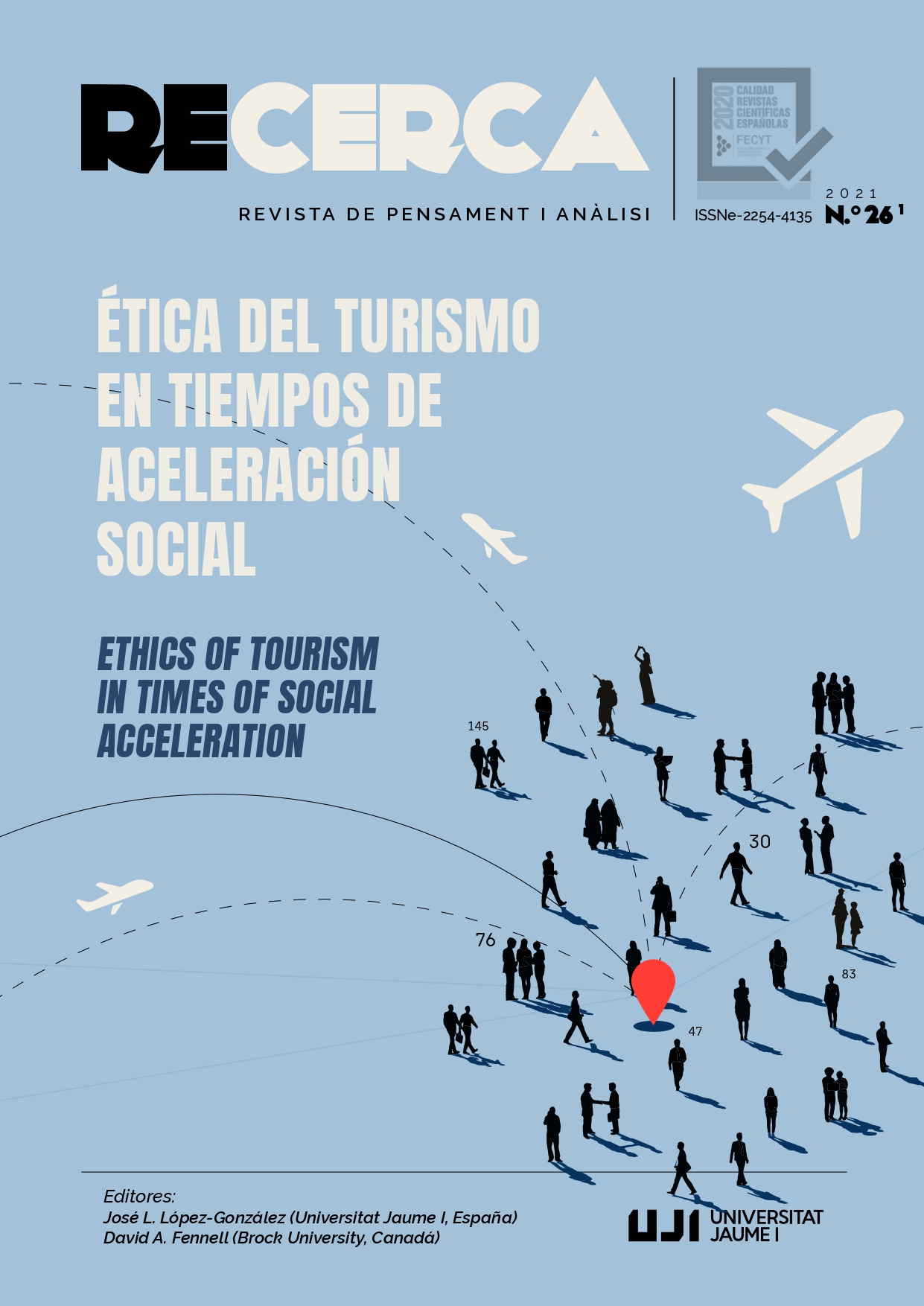Global Coordination and Regulation of Tourism: Radicalizing Kant’s Cosmopolitanism
Main Article Content
Abstract
Tourism is a complex phenomenon in scale and scope. Interrelated with other systems (ecological, social, economic, political) from the local to the global, its impacts and effects transcend borders, making coordination and regulation highly challenging. Global mobilities (both physical and virtual) and neoliberal globalization further complicate enabling just and sustainable tourism. New forms of governance are needed to address global threats like climate change and pandemics. This paper explores Immanuel Kant’s transcendental perspective on “perpetual peace” and traces his evolving cosmopolitanism over a decade of essays. We then turn towards what appears to be a contradictory, immanent posthumanist approach from Gilles Deleuze. Radicalizing Kant using Deleuze leads to a different concept of ‘normativity’, grounded in an ideal of perpetual self-critique and self-creation. Such a critical, affirmative ethic opens possibilities for situated approaches to cosmopolitan rights and global justice, rather than global regulatory structures to coordinate effective and proactive actions.
Downloads
Article Details
References
Alston, Philip (2019), “Climate change and poverty: report of the special rapporteur on extreme poverty and human rights”, Report pre-sented to the UN Human Rights Council Forty-first session, 24 June–12 July, A/ HRC/41/39. Retrieved from: https://www.ohchr.org/EN/NewsEvents/Pages/DisplayNews.aspx?NewsID=%2024735&LangID=E.
Bianchi, Raoul & de Man, Frans de (2020) Tourism, inclusive growth and decent work: a political economy critique, Journal of Sustainable Tourism, DOI: 10.1080/09669582.2020.1730862.
Bianchi, Raoul & Stephenson, Marcus (2014), Tourism and Citizenship: Rights, Freedoms and Responsibilities in the Global Order, New York, NY: Routledge.
Bohman, James & Lutz-Bachmann, Matthias (eds.) (1997). Essays on Kant’s Cosmopolitan Ideal. New Baskerville, USA: MIT Press.
Braidotti, Rosi & Pisters, Patricia (2012). Revisiting Normativity with Deleuze. London, New York: Bloomsbury.
Bryant, L.evi (2008). Difference and givenness: Deleuze’s transcendental empiricism and the ontology of immanence. Evanston: North-western University Press.
Carr, Cheri Lynne (2018). Deleuze’s Kantian Ethos: Critique as a way of life. Edinburg: Edinburg University Press.
Colebrook, Claire (2012). Norm Wars. In Revisiting Normativity with
Deleuze. London, New York: Bloomsbury, 81-97.
Dredge, Dianne & Jenkins, John (Eds.). (2016). Stories of Practice: Tour-ism policy and planning. New York: Routledge.
Deleuze, Gilles (1994). Difference and Repetition. New York: Columbia University Press.
Deleuze, Gilles (2008). Kant’s Critical Philosophies: The Doctrine of the Faculties. London: The Anthalone Press. Hugh Tomlinson and Barbara Habberjam (trans.).
Deleuze, G. & Guattari, Felix (1987). A Thousand Plateaus: Capitalism and Schizophrenia. Minneapolis: University of Minnesota Press.
Escobar, Arturo (2018). Designs for the Pluriverse. Durham: Duke Univer-sity Press.
Fraser, Nancy (2010). Scales of justice: Reimagining political space in a globalizing world. New York: Columbia University Press.
Gössling, Stefan, Scott, Daniel & Hall, Colin Michael (2020) Pandemics, tourism and global change: a rapid assessment of COVID-19, Journal of Sustainable Tour-ism, DOI: 10.1080/09669582.2020.1758708.
Habermas, Jürgen. (1997). Kant’s Idea of Perpetual Peace, with the Benefit of Two Hundred Years Hindsight. In Bohman, James and Lutz-Bachmann, Matthias (Eds). Essays on Kant’s Cosmopolitan Ideal (113-154), New Baskerville, USA: MIT Press.
Hall, Colin Michael (2011). A typology of governance and its implica-tions for tourism policy analysis. Journal of Sustainable Tour-ism, 19(4–5), 437–457.
Horkheimer, Max. & Adorno, Theodore (2002) Dialectic of En-lightenment: Philosophical Fragments, G. S. Noerr (Ed.), Stanford: Stanford University Press, 2002.
Horowitz, Jason (2020). Venice glimpses a future of future tourists and likes what it sees. New York Times, June 3, 2020. Retrieved from: https://www.nytimes.com/2020/06/03/world/europe/coronavirus-venice-tourists.html.
Jamal, Tazim (2019). Justice and Ethics in Tourism. London and NY: Routledge.
Kant, Immanuel (1784). Idea for a Universal History from a Cosmopolitan Perspective. In Kleingeld, Pauline (Ed.). Toward Perpetual Peace and Other Writings on Politics, Peace, and History (3-16). New Haven: Yale University Press, 2006. (David Colclasure, trans.).
Kant, Immanuel (1785). Groundwork of the Metaphysics of Morals. In Gregor, Mary (Ed. and trans.). Immanuel Kant: Practical Philoso-phy (37-108). Cambridge: Cambridge University Press, 1996.
Kant, Immanuel (1793). On the Common Saying: This May be True in Theory but it is of no use in practice. In Gregor, Mary (Ed. and trans.). Immanuel Kant: Practical Philosophy (273-310). Cam-bridge: Cambridge University Press, 1996.
Kant, Immanuel (1795). Toward Perpetual Peace: A Philosophical Sketch. In Gregor, Mary (Ed. and trans.). Immanuel Kant: Practical Philosophy (311-352). Cambridge: Cambridge University Press, 1996.
Kleingeld, Pauline (1998). “Kant's Cosmopolitan Law: World Citizenship for a Global Order,” Kantian Review, 2: 72–90.
Kleingeld, Pauline & Brown, Eric (2014). Cosmopolitanism. In Ed Zalta (Ed.). The Stanford Encyclopedia of Philosophy (Fall). Retrieved from https://plato.stanford.edu/archives/fall2014/entries/cosmopolitanism/.
López-González, José Luis (2018) From the Ethical Code to the Interna-tional Convention. A Critical Panorama of The World Tourism Or-ganization from the Cosmopolitanism Perspective. OXÍMORA REVISTA INTERNACIONAL DE ÉTICA Y POLÍTICA NÚM. 12. 205-223. ENE-JUN 2018. doi: 10.1344/oxi.2018.i12.20598 (Title trans-lated)
Mair, Judith, Ritchie, Brent & Walters, Gabby (2016), Towards a re-search agenda for post-disaster and post- crisis recovery strate-gies for tourist destinations: a narrative review. Current Issues in Tourism, 19(1), 1-26.
Modern Diplomacy (2020). UNWTO convenes Global Tourism Crisis Committee. Newsroom, March 26, 2020. https://moderndiplomacy.eu/2020/03/26/unwto-convenes-global-tourism-crisis-committee/.
Mowforth, Martin & Munt, Ian (2016). Tourism and Sustainability: Development, globalisation and new tourism in the Third World. Routledge: London and New York.
Novelli, Marina, Gussing Burgess, Liv, Jones, Adam, & Ritchie, Brent (2018), ‘No ebola. . .still doomed’ – the ebola-induced tourism crisis. Annals of Tourism Research, 70, 76-87.
Nussbaum, Martha (1996). Patriotism and cosmopolitanism. In Cohen, Joshua (Ed.). For Love of Country: Debating the Limits of Patriotism (3-17). Boston: Beacon Press. Also online: http://bostonreview.net/martha-nussbaum-patriotism-and-cosmopolitanism.
Nussbaum, Martha (2019). The Cosmopolitan Tradition: A Noble but Flawed Ideal. Cambridge, MA: Harvard University Press.
Rawls, John (1993). The Law of Peoples. Critical Inquiry, 20(1), 36-68.
Wainwright, Joel & Mann, Geoff (2018). Climate Leviathan: A political theory of our planetary future. London: Verso.
World Health Organization (2020). A Joint Statement on Tourism and COVID-19 - UNWTO and WHO Call for Responsibility and Coordi-nation. 27 February, 2020. Newsroom. Retrieved from: https://www.who.int/news-room/detail/27-02-2020-a-joint-statement-on-tourism-and-covid-19---unwto-and-who-call-for-responsibility-and-coordination.
Young, Iris Marion. (2006). Responsibility and global justice: A social connection model. Social Philosophy and Policy, 23(1), 102–130.


